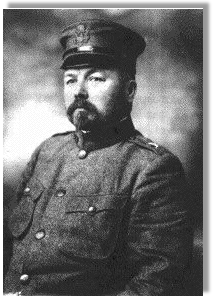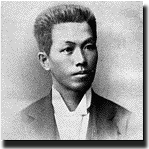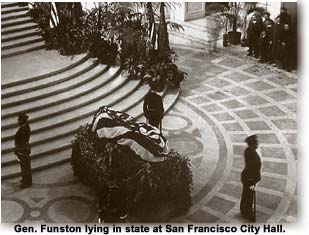General Frederick Funston (1865-1917) (original) (raw)
“An Attack on General Funston,” by Henry Anderson Lafler
Gen. Funston Museum, Iola, Kansas
Frederick Funston’s Kansas Speech
"The Story of My Capture... ." by Emilio Aguinaldo
Emilio Aguinaldo photograph courtesy of Institut für Völkerkunde (Institute of Social Anthropology), University of Vienna.
 Frederick N. Funston’s service record compiled in 1903 by the Adjutant General’s Office.
Frederick N. Funston’s service record compiled in 1903 by the Adjutant General’s Office.
Born in Ohio, September 11, 1865
Entered the service as:
Colonel, 20th Kansas Volunteer Infantry, 13 May, 1898
Appointed Brigadier General, U.S. Volunteers, 1 May, 1899
Appointed Brigadier General, U.S. Army, 1 April, 1901
**S e r v i c e :
Commanded his regiment en route to and at San Francisco, California to October 27, 1898, when he sailed with it for the Philippine Islands, arrived Manila Nov. 30, and served there-into September 3, 1899, being in command of the 1st Brigade, 2d Division, 8th Army Corps, May 22 to July 4, 1899.
He was absent sick and on leave, September 3 to December 26, 1899.
 In command of the 3d Brigade, 2d Division 8th Army Corps January 5 to April, 1900; the 4th District, Department of Northern Luzon, to September, 1901, during which period he was frequently in the field in active operations, and in the capture of Aguinaldo, March 23, 1901.
In command of the 3d Brigade, 2d Division 8th Army Corps January 5 to April, 1900; the 4th District, Department of Northern Luzon, to September, 1901, during which period he was frequently in the field in active operations, and in the capture of Aguinaldo, March 23, 1901.
Sick in Hospital and on sick leave, to April 10, 1902.
Commanding Department of the Colorado to March 18, 1903, and commanding the Department of the Columbia since March 23, 1903.
He was awarded the Medal of Honor, February 14, 1900, for most distinguished gallantry in action at Rio Grande de la Pampanga, April 27, 1899, when Colonel, 20th Kansas Infantry, in crossing the river on a raft and by his skill and daring enabling the General Commanding to carry the enemy’s entrenched position on the north bank of the river and drive him with great loss from the important strategic position of Calumpit.
Recommended by Major General [Arthur] MacArthur for brevet of Major General of Volunteers for gallant and meritorious services throughout the campaign against Filipino insurgents from February 4 to July 1, 1899.
March 28, 1901, General MacArthur cabled, describing the capture of Aguinaldo on March 23, 1901.
“The transaction was brilliant in conception and faultless in execution, all credit must go to Funston who, under supervision of General Wheaton, organized and conducted expedition from start to finish. His reward should be signal and immediate.”
"In 1902, General Wheaton said: “I am under great obligations to Brigadier Generals * * * Funston who have since my last report, at various places, held command within the territorial limits of the Department. Their able and energetic execution of all operations committed to them has my highest commendation... .”
Adjutant General’s Office, Washington, July 22, 1903.
Before Gen. Funston’s assignment to San Francisco and the Department of California, he was the object of Mark Twain’s venom and ridicule in the May 1902 North American Review article, “A Defence of General Funston.”
The Twain article appeared at about the time Gen. Funston spoke in Denver, and criticized those who did not support the war in the Philippines. A small article appeared in the April 21st Washington, D.C., newspaper about Funston’s speech.
GAMBLE IN COUNTRY’S BLOOD Gen. Funston Scores Men Who Oppose Holding the Philippines.
Denver Col., April 20. – Gen. Frederick Funston was the principal speaker at the banquet last night of the Colorado Society Sons of the Revolution. His reference to the Philippines was on the lines of his previous speeches. The prolongation of the war, he declared was due more to outside influences than the desire of the Filipinos for independence. Gen. Funston said:
“I have only sympathy for the senior Senator from Massachusetts who is suffering from an overheated concience.“
He, however, expressed great contempt for the men who, he declared, at the beginning of the war would have had us take everything Spain had, but are now “playing peanut politics and gambling in the blood of their countrymen.”
Jim Zwick, doctoral candidate at Syracuse University, and scholar of the Philippine War period, wrote, “The Massachusetts senator that Funston criticized in his 1902 speech in Denver was George Frisbie Hoar. He was an outspoken anti-imperialist but also a Republican, and Roosevelt’s reaction to Funston’s speech was based on Hoar’s party affiliation.”
The newspaper clipping was enclosed with a note sent by the president to Secretary of War Taft:
Personal.
THE WHITE HOUSE WASHINGTON.
April 21, 1902.
To the Secretary of War:
I call attention to the enclosed report of a speech by General Funston. The reference to the senior senator from Massachusetts is entirely improper in a general of the army. I think that General Funston will have to be requested not to make any more public speeches. I appreciate to the full his great services. I am in cordial sympathy with his general view on the Philippines, but he expresses himself at times in a way that is very unfortunate.
(signed) T. Roosevelt
Enclosure.
Gen. Funston was also criticized for methods used to capture Aguinaldo. A “Boston Post” editorial in May 1902 said:
“When the capture of Aguinaldo by Funston was announced by cable, it was hailed as a great exploit. President McKinley lost no time in making him a brigadier-general. But, as the details have come to light, contempt and disgust have taken the place of admiration. The American people accepted, though not without some qualms of conscience, the forgery, treachery and disguise with which Funston prepared his expedition. But until recently the full infamy of his conduct has not been understood. The historian of his expedition, Edwin Wildman, thus describes the last stage of Funston’s march: ’Over the stony declivities and through the thick jungle, across bridgeless streams and up narrow passes, the footsore and bone-racked adventurers tramped, until their food was exhausted and they were too weak to move, though but eight miles from Aguinaldo’s rendezvous. A messenger was sent forward to inform Aguinaldo of their position and to beg for food. The rebel chieftain promptly replied by dispatching rice and a letter to the officer in command, instructing him to ‘treat the American prisoners well.’
“This incident was passed over lightly in the earlier reports. Its full significance has just begun to dawn upon the American people.”
Seven years after the Great Earthquake and Fire, A.A. Watkins, president of the Board of Trade of San Francisco, wrote to the newly-inaugurated President Woodrow Wilson:
---
> March. 11, 1913
To the President of the United States, Washington D.C.
Dear Sir:-
Speaking on behalf of the wholesale merchants and manufacturers of San Francisco, this Association earnestly requests you appoint Brigadier General Funston to the position of Major General of the United States Army to fill the first vacancy occuring in that grade.
We understand that Brigadier General Funston is the ranking Brigadier General of the line of the Army and in view of his splendid record in the Philippines and his great services to San Francisco when our City was devastated by earthquake and fire, we respectfully urge that General Funston is entitled to and should receive the promotion in question.
Board of Trade of San Francisco,
by A.A. Watkins, President
There were two handwritten notations on the letter; One from U.S. SenatorJames Duval Phelan said: “I earnestly concur in the recommendation of the Board of Trade as an act of justice.”
The other notation was from Mayor James Rolph: “I heartily endorse the recommendations herein.”
 As America prepared for World War I, President Woodrow Wilson and Secretary of War Newton D. Baker believed Gen. Funston was the right officer to command the Allied Expeditionary Force (AEF) to France. Funston, however, died February 19, 1917, and the AEF command was given to Gen. John Pershing. Brigadier General Funston laid in state at San Francisco’s City Hall rotunda on February 23rd and 24th, 1917, and was buried at the Presidio.
As America prepared for World War I, President Woodrow Wilson and Secretary of War Newton D. Baker believed Gen. Funston was the right officer to command the Allied Expeditionary Force (AEF) to France. Funston, however, died February 19, 1917, and the AEF command was given to Gen. John Pershing. Brigadier General Funston laid in state at San Francisco’s City Hall rotunda on February 23rd and 24th, 1917, and was buried at the Presidio.
In his memoirs, Reminiscences, Douglas MacArthur, son of Gen. Arthur MacArthur, wrote of how he broke the news to the president and secretary of war, and how General Pershing was selected to replace General Funston:
“It was February 19 1917, and I had the night watch for the General Staff. My old friend, Peyton March, a lieutenant Colonel in the Adjutant General’s Department, had a similar duty in that office. Secretary Baker was giving a formal dinner that night for the President and left word not to be disturbed unless something of importance took place. About 10 o’clock March brought up a wire that General Funston, who had been informally selected to command an American Expeditionary Force if we entered the war, had just dropped dead in the St. Anthony Hotel in San Antonio. We agreed that the Secretary should be told at once. When I reached the Secretary’s home, the butler refused to let me enter, saying that he had orders to admit no one. The dining room looked out on the entrance hall and I could see it plainly. It was a gay party, with lights and laughter, the tinkle of glasses, the soft music from an alcove, the merry quips and jokes of a cosmopolitan group. I finally pushed by the butler and tried to attract the attention of the Secretary so I could report to him privately what had occurred. But the President saw me and sang out in the most jovial manner, ‘Come in, Major, and tell all of us the news. There are no secrets here.’ There was a general clapping of hands at this, and I knew I was in for it. So I clicked my heels together, saluted him, and barked in a drill-sergeant tone, ‘Sir, I regret to report that General Funston has just died.’ Had the voice of doom spoken, the result could not have been different. The silence seemed like that of death itself. You could hear your own breathing. Then, I never saw such a scattering of guests in my life. It was a stampede.
“The President and Secretary took me into an adjacent room and dictated a message of sympathy to Mrs. Funston. Mr. Wilson then turned to the Secretary and said, ‘What now, Newton, who will take the Army over?’ The Secretary paused a moment and then, instead of a direct reply, asked me, ‘Whom do you think the Army would choose, Major?’ It was a poser, but I had my own positive views and replied, ‘I cannot, of course, speak for the Army, but for myself the choice would unquestionably be General Pershing.’ The President looked at me, a long inquisitive look, and then said quietly, ‘It would be a good choice.’
“I first met General Pershing, then a captain of Cavalry, in my father’s office in downtown San Francisco. I had just graduated from West Point, and I shall never forget the impression he made on me by his appearance and bearing. He was the very epitome of what is now affectionately called the ‘Old Army.’ As Pershing left, he turned to my father and said, ‘General MacArthur, I am sure Douglas and I will meet again.’ How true and how often!”
Gen. Funston’s Bibliography from the Library of Congress Information System
1. 17-24511: Tomlinson, Everett Titsworth, 1859- Scouting with General Funston, Garden City, New York, Doubleday, Page & company, 1917. xi, 243, [1] p. front., plates. 20 cm. LC CALL NUMBER: PZ7.T597 Scwg
- 11-28373: Funston, Frederick, 1865-1917. Memories of two wars; Cuban and Philippine experiences, New York, C. Scribner’s sons, 1911. xv, 451 p. front. (port.) plates. 24 cm..
LC CALL NUMBER: Microfilm 33391 DS - 01-10174: Halstead, Murat, 1829-1908. Aguinaldo and his captor; Cincinnati, The Halstead publishing company, 1901. p. cm..
LC CALL NUMBER: Microfilm 9418 DS - 90-184403: Crouch, Thomas W., 1932- A leader of volunteers : Frederick Funston and the 20th Kansas in the Philippines, 1898-1899 / Lawrence, Kan. : Coronado Press, 1984. xi, 249 p., 14 leaves of plates : ill. ; 22 cm..
LC CALL NUMBER: DS683.K342 C76 1984 - 86-4938: Bain, David Haward. Sitting in darkness : Americans in the Philippines / New York : Penguin Books, c1986. 467 p. : ill. ; 20 cm..
NOT IN LC COLLECTION - 84-8945: Bain, David Haward. Sitting in darkness : Americans in the Philippines / Boston : Houghton Mifflin, 1984. 464 p., [40] p. of plates : ill. (some col.) ; 24 cm..
LC CALL NUMBER: DS679 .B34 1984 - 75-20193: Crouch, Thomas W., 1932- A Yankee guerrillero : Frederick Funston and the Cuban insurrection, 1896-1897 / [Memphis] : Memphis State University Press, c1975. vii, 165 p. : ill. ; 22 cm..
LC CALL NUMBER: F1786.F86 C76
